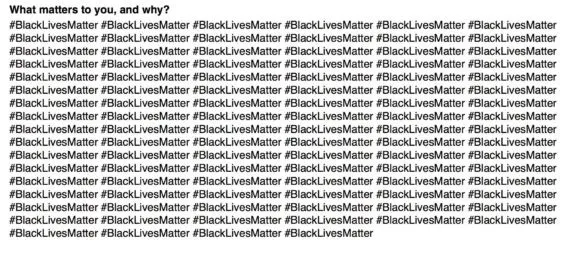Table of Contents
“What matters to you and why?” This question was my favorite part of Stanford’s application. In my application, I discussed why Africa matters to me. I explained that my connection to the continent was not simply ancestral, recounting how seven trips to Africa inspired a lifelong interest in wildlife and the promises and perils facing the developing world.
Ziad Ahmed, an applicant to the Stanford class of 2021, had a decidedly different take on the question. His essay consisted solely of the statement “#BlackLivesMatter,” repeated 100 times.
Ziad’s refusal to explain his position is unfortunate. Stanford asks its applicants to articulate why they hold certain values because the spirit of examining one’s own beliefs and challenging others’ perspectives is at the core of what makes Stanford intellectually vibrant. Beyond the application process, Stanford organizes a popular discussion series entitled “What Matters to Me and Why,” designed to “encourage reflection within the Stanford community on matters of personal values, beliefs, and motivations.”
Given that Ziad is not black, his explanation as to why and how he came to identify so strongly with the Black Lives Matter movement could have made for an interesting essay. However, according to Ziad, the very act of seeking an explanation “is inherently dehumanizing.” The Stanford Office of Undergraduate Admission apparently viewed this excuse as legitimate, so much so that they invited him to join the Stanford class of 2021.
Of course, Ziad’s claim is valid: black lives most certainly matter. The Black Lives Matter movement reflects the legitimate sentiments of frustration and abandonment on the part of many Americans; given my own background, I am intimately familiar with the anguish that pervades many communities across America. Moreover, it is incumbent upon American society to understand and address the concerns of its citizens.
But regardless of how legitimate Ziad’s claim may be, his refusal to provide an explanation directly undermines Stanford’s values of open inquiry and self-reflection. By inviting Ziad to join the Stanford community, the university has legitimized the notion that, in many cases, it is offensive even to ask someone to clarify or explain their beliefs — let alone question them. In fairness, the admissions office likely did not anticipate that Ziad would publicize his answer to the 3rd essay prompt on social media. Nevertheless, Stanford seems to have departed from its traditional role as a platform for intellectual discourse and the free exchange of viewpoints.
In the 1960s, universities became places where radical ideas, seldom articulated elsewhere, were advertised and debated. For decades since, university students have been exposed to arguments for Marxism, anarchism, and other such controversial ideologies. While many criticized universities for allowing the consideration of dangerous ideas that contradicted American principles, universities did nonetheless expand the scope of intellectual discourse. However, in more recent years, campus radicals have snuck into the campus mainstream and shunned ideas that undermine their own.
The radicals who dominate campus discourse today propagate the deeply anti-intellectual claim that some beliefs must simply be taken as inherently true, with no basis for disagreement. This line of convoluted logic is frequently used by campus radicals to discourage debate, viciously silence speakers whose views they find objectionable, and organize “safe-spaces” to shelter people from ideas with which they may disagree, claiming that these ideas make them feel “unsafe.” By offering admission to those who feel that their views are too pious to explain, the admissions office is fueling this intellectual pollution.
Some might note that Ziad was simply an exceptional applicant, whose passionate “unapologetic activism” landed him a visit to former President Obama in the White House and a job on the Clinton campaign. Hence, some argue, the admissions office may have been disappointed by his essay but admitted him on the basis of his academic and extracurricular achievements. Ziad was probably qualified to be admitted into Stanford, and I do not intend in any way to diminish his impressive accomplishments.
However, I doubt that Stanford would have admitted an applicant of equal qualifications who, in an effort to display his passion for God and country, answered the essay question by repeating the phrase #GodBlessAmerica 100 times. Rejecting such an applicant would be entirely understandable. Why should the university admit someone who makes a claim and refuses to explain their reasoning?
If Stanford is committed to holding its students to the intellectual standard that its painfully low acceptance rate demands, it should not have offered Ziad Ahmed a spot in the class of 2021.




